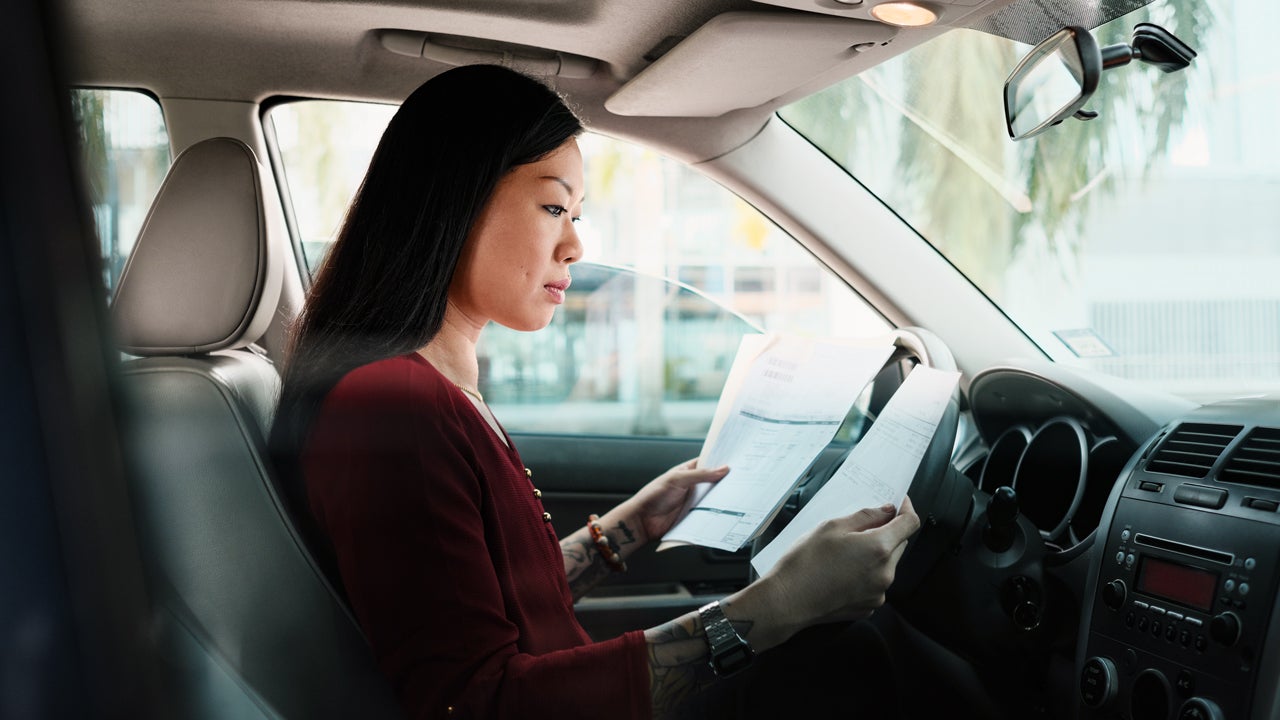Commercial auto insurance

Commercial auto insurance isn’t just for big corporations. If you drive for work, you may need a commercial policy instead of a personal one. This type of insurance functions a little differently from personal auto insurance, so it’s worth understanding the ins and outs of commercial policies if you regularly use a vehicle for business purposes.
What is commercial auto insurance?
Commercial auto insurance is coverage that covers liability and accident costs associated with vehicles used for business-related purposes. Any vehicle used by a business — from delivery trucks and vans to food trucks and ordinary passenger vehicles — must typically be covered by a commercial car insurance policy.
The basic coverage included in a commercial car insurance policy is similar to the coverage you may be familiar with from your personal auto policy: bodily injury and property damage liability, medical payments or personal injury protection (PIP) coverage, uninsured/underinsured motorist insurance and physical damage coverage are all common. Most commercial auto insurance policies are also subject to optional endorsements and discounts that may help to customize company car insurance coverage.
Commercial vs. personal insurance
The differences between commercial and personal insurance come down to the different insurance needs of a business and an individual. If your car is in your own name and used primarily for personal purposes — which includes commuting to and from work and even between job sites — you typically won’t need a commercial insurance policy to cover your liability.
Commercial insurance steps in when a vehicle is regularly used for business purposes, such as deliveries or transporting work equipment, or if it’s registered in the name of the company. Commercial insurance often comes with higher coverage limits to cover the higher liability to which a business is subject. As a result, commercial insurance policies typically cost more and may be tax deductible in order to help business offset the cost of coverage.
| Personal auto insurance | Commercial auto insurance | |
| Vehicle ownership | Owned by an individual | Owned by an individual or a business |
| Vehicle use | Personal errands, commuting, pleasure | Business-related purposes, e.g. delivery |
| Type of vehicle | Light-duty passenger vehicles | Heavy-duty vehicles AND light-duty vehicles |
| Coverage limits | Limited | Higher limits available |
| Tax deductible | No | Sometimes |
Who needs commercial auto insurance?
Any business that owns and uses vehicles as part of its business function — whether it’s one car or an entire fleet — needs to have commercial car insurance. Some examples of businesses that need commercial auto insurance include:
- Electricians and HVAC professionals that visit people’s homes
- Food delivery drivers and catering companies
- Contractors that haul materials and heavy equipment to job sites
- Landscapers and plow trucks
Employees who frequently use their personal vehicle for business purposes might also want to consider buying commercial car insurance. Some examples include:
- Realtors who drive to property listings
- Salespeople who travel to various locations
- People who drive for a ridesharing or delivery service
Because these types of employees might use their personal vehicles, they might be able to maintain personal auto insurance or use rideshare insurance as an alternative. Some personal auto policies allow drivers to stipulate if a car is used for business purposes, although those purposes are much more limited than commercial car insurance. If you’re not sure whether you need a commercial insurance policy, speak with a licensed insurance agent about your options.
Using your vehicle to travel to and from an office on a regular daily commute is not considered business use and, therefore, commercial insurance isn’t applicable. For vehicles used for commutes, there is usually a “commute” classification on personal auto insurance policies. You typically only need to consider commercial insurance if you are using your vehicle as part of a profit-making venture.
Top commercial auto insurance companies
When shopping for commercial auto insurance, you may want to do business with a company you’re familiar with. These are the top five commercial auto insurers by market share, four of which also offer personal auto policies:
- Progressive: In addition to personal auto insurance policies, Progressive sells commercial car insurance to delivery companies, contractors and other businesses in need of specialized coverage. Average prices range from $257 to $270 per month, with a wide range of endorsements available depending on business needs.
- Travelers: Travelers offers both fleet and non-fleet commercial insurance with endorsements such as rental car coverage and blanket coverage for additional insureds.
- Old Republic: Old Republic Insurance Group includes a handful of different insurance companies providing business-specific insurance solutions, including commercial auto.
- Liberty Mutual: Liberty Mutual’s commercial auto offerings include coverage for businesses with just a few vehicles or for an entire fleet.
- Geico: Geico offers six types of commercial auto insurance: truck insurance, box truck insurance, non-trucking liability insurance, cargo insurance, dump truck insurance and owner-operator insurance.
Commercial car insurance and the gig economy
The gig economy has changed how many people earn a living. Companies like Uber, Lyft, DoorDash and Instacart have exploded in popularity. But do drivers for these companies need commercial auto insurance?
It depends. Many personal car insurance providers offer endorsements for these types of drivers, but they might not apply in all situations. For example, most personal auto insurance endorsements for ridesharing drivers, like drivers for Uber and Lyft, only provide coverage while the app is turned on and searching for a ride, but stop the coverage once a driver has accepted a passenger. At that point, coverage should be provided by the ridesharing company, but the coverage limits provided might not be very high.
If you drive for any kind of ridesharing or delivery company, talk to your insurance agent. Depending on how often you are driving — part-time or full-time — you might need a commercial insurance policy to properly cover yourself any time you’re on the clock and behind the wheel.
How to get commercial insurance
Applying for commercial car insurance is a bit different from getting personal car insurance. If you’re looking to buy commercial insurance for the first time, here are some steps to follow:
- Find a few providers: Shop around and find a few insurance providers that offer commercial auto insurance in your area. You could evaluate these companies based on customer reviews, financial strength ratings and the types of coverage offered. You can even call up an agent to get a better sense of the carrier’s customer service.
- Provide information about your business: Some companies have online quote tools, and others require you to call an agent. In either case, you will need to provide information about your business, including what the business does, how long it’s been around and what your company cars are used for.
- Provide information about the company cars: Next, you’ll be asked to list the type(s) of vehicle your business owns. In addition to the make, model and year, you might also need to disclose information like the vehicle’s original cost, the weight and size, how far employees typically drive and who the main driver of the vehicle is. This information plays a large role in how much commercial auto insurance is and what you can expect it to cost.
- Provide information about the drivers: Next, be prepared to give some information about the people who drive the vehicles. You will probably need to provide the drivers’ license numbers of your employees so the insurance company can validate them as legal drivers and check their driving records.
- Get a quote: Once you’ve submitted the required information, you’ll be given a commercial car insurance quote based on your responses. It can be a good idea to get quotes from several different insurance companies to see which one can best meet your needs.
- Sign a policy: After choosing an insurance company and customizing your coverage with an agent, you can sign the policy and begin your coverage. Be sure to ask for multiple copies of your proof of commercial car insurance documentation and leave one in each insured company car.
How much does commercial insurance cost?
Commercial car insurance is generally more expensive than personal car insurance because the coverage limits tend to be higher. However, there are a number of factors used to determine the cost of your policy. Some of those factors include:
- The type of vehicle and the original cost
- The driving records of the employees who use the car
- The nature of the vehicle’s use
- How far the vehicle is driven
- The number of cars being insured
- The policy’s coverage limit
- The deductibles
- The business owner’s claims history
As with personal auto insurance, carriers may offer discounts for business car insurance. For instance, if you buy multiple products from a single insurer — say, commercial auto coverage and a general liability policy for your business — you may be eligible for a discount on both products. Many insurers also offer discounts for policies paid in full or fleets that install electronic tracking devices for telematics purposes.
What does commercial auto insurance not cover?
Commercial auto insurance may cover your personal vehicle, but only if you are using it for business-related purposes. While a morning commute may seem like it falls under this umbrella, it generally does not. If you are commuting to the office in your personal vehicle, you would be covered by your personal car insurance policy. However, if you are using your personal vehicle to drive a client to a work function, that is when a commercial auto insurance policy would kick in. Commercial car insurance does not usually extend to rental vehicles used for work, either.
Tools and equipment can also be a gray area. Work-related equipment that is attached to a commercial vehicle is usually covered by a commercial auto insurance policy. In order for non-attached equipment to be insured, it must be scheduled on a business equipment policy. If you’re not sure what is and isn’t covered by a commercial or personal policy during your workday, you may want to speak to the agents who manage your policies to get clarity.
Frequently asked questions
Why we ask for feedback Your feedback helps us improve our content and services. It takes less than a minute to complete.
Your responses are anonymous and will only be used for improving our website.








